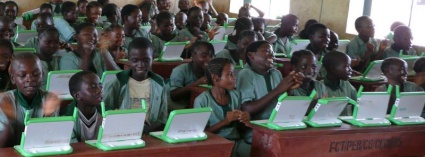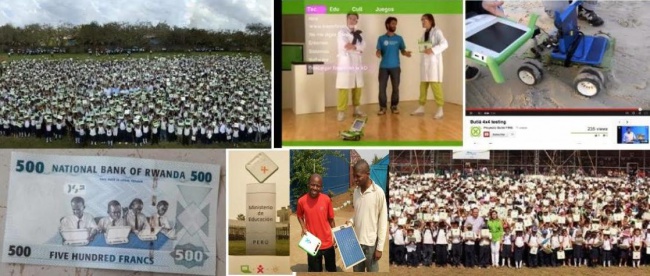Senegal: Difference between revisions
No edit summary |
No edit summary |
||
| (5 intermediate revisions by 3 users not shown) | |||
| Line 8: | Line 8: | ||
Deployment= | |
Deployment= | |
||
Keyboard=[[OLPC_Senegal_Keyboard|French Layout]]| |
Keyboard=[[OLPC_Senegal_Keyboard|French Layout]]| |
||
Spoken=French (fr) The official language of the Senegal is French. |
Spoken=French (fr) The official language of the Senegal is French. There are 2 main language 'families' spoken in Senegal: Atlantic and Mande, The Atlantic family, generally found in the western half of the country, contains the languages most widely spoken in Senegal—Wolof, Serer, Fula, and Diola. Mande languages are found in the eastern half and include Bambara, Malinke, and Soninke.| |
||
Written=French (fr)| |
Written=French (fr)| |
||
Written2=English (en)| |
Written2=English (en)| |
||
Spoken2= |
Spoken2=Wolof, Serer}} |
||
== Bienvenue-Welcome == |
== Bienvenue-Welcome == |
||
| Line 28: | Line 28: | ||
Please feel free to create links, (sub-)categories or list or start collaborating, teaming up and expanding our and your projects, existing and new ones in one of these (sub-)categories. |
Please feel free to create links, (sub-)categories or list or start collaborating, teaming up and expanding our and your projects, existing and new ones in one of these (sub-)categories. |
||
[[File:OLPC A4 landscape Collage.jpg|650 px|center]] |
|||
Senegal is one of the 18 partner countries of Belgian governmental cooperation were selected on the basis of their degree of poverty, aspects of good governance and [[Belgium]]’s potential for providing meaningful support. The precise criteria for selecting countries are set out in the law on international cooperation, which limits the maximum number of recipients to 18 partner countries. |
Senegal is one of the 18 partner countries of Belgian governmental cooperation were selected on the basis of their degree of poverty, aspects of good governance and [[Belgium]]’s potential for providing meaningful support. The precise criteria for selecting countries are set out in the law on international cooperation, which limits the maximum number of recipients to 18 partner countries. |
||
| Line 50: | Line 52: | ||
#[[OLPC Afrique]] |
#[[OLPC Afrique]] |
||
#[[Deployment Guide]] |
#[[Deployment Guide]] |
||
== Known Deployments == |
|||
In 2010 100 XO 1.5's were introduced in CEM [https://maps.google.be/maps?ll=14.04367,-16.677965&spn=0.007785,0.011029&t=h&z=17&lci=com.panoramio.all Ile de Mar], a secondary school on the isle of Ile de Mar in the Sine-Saloum delta, 150 km south-east of Dakar. CEM Ile de Mar is a Dutch project, initiated by the [http://www.zegaaneenschoolbouwen.nl Dutch Foundation Ile de Mar]. Currently, januari 2014, still 60 XO's 1.5 of the 100 are operational and used on a daily basis. 20 Pieces are taken back to Holland for repairs. If sufficient spare parts are available, those 20 will return next April 2014. This means that after repairs more than 3 years after introduction, 80% of the XO's are still in use. |
|||
The XO is a very useful and probably the best laptop for children in educational environments. However, for small deployments, it is very hard to get support and spare parts. Also purchase of small amounts makes it very hard to deploy the XO laptop and/or OLPC tablet. |
|||
== Next in line for deployment == |
== Next in line for deployment == |
||
Latest revision as of 06:39, 23 May 2017
The viewpoints expressed hereunder do not necessarily reflect the opinion of OLPC.
This page was created by a member of the free volunteer community supporting OLPC.
| Country Information | |
| ISO Country Code | DZ |
| Wikipedia Article | Wikipedia Link |
| Government Support | Invalid Support Param |
| Deployment | Invalid Deployment Param |
| Languages | |
| Keyboard Layout | French Layout |
| Written | French (fr) |
| Spoken | French (fr) |
| Secondary Written | English (en) |
| Secondary Spoken | Wolof, Serer |
Bienvenue-Welcome
... and thanks for visiting the pages for OLPC related matters in Senegal. OLPC is the One Laptop Per Child Universal Primary Education project and largest educational project undertaken by Humanity ever. Supported by United Nations, OLPC is an "Open Commmunity" project, similar to the Wikipedia and Open Source Community projects, like Linux, OpenOffice, etc. and it is working along Agenda 21 and Millennium Development Goal nr.2: Bringing Universal Primary Education. To edit text on this page or add pages, log in and and "edit page / save page" button will appear.
- 2' video - OLPC Intro part 1
- 2' video - OLPC Intro part 2
The aim of this educational project is on one hand to bring Universal Primary Education by 2015 as - anno year 2000 initiated - United Nations Millennium Development Goal nr.2. On the other hand, OLPC's mission is to manage the open hard and software project, to bring forward the best possible laptop combination for education: the XO-XServer combination. For this and above approach, - and also a lot of lobbying by the right persons on the right places and time - the United Nations is a Partner in this Open Community project! It is the largest educational project undertaken by Humanity ever, and deemed by many as one of the most inspiring projects out there. Things are moving very fast indeed: 2008 saw the first 3 countries with full coverage, i.e. with all kids age 5 to 12 equipped with these smallest schools in a box-laptops and Australia is now following at fast pace too, over 86.000 eBooks available, all education disciplines covered, etc. etc..
Beaucoup d'inhabitants cherchent fortune ailleurs. Therefore there is a very very large diaspora. We hope that this diaspora will work their way to these pages, set-up, link-up their projects with OLPC, coordinate projects and that they can inspire many in their host countries to come along. It is so difficult in these host countries to develop additional value and hence make money. In many regions in the home country however it is so easy as everything is to be developed.
Also the societies from the host countries will benefit from the Senegal diaspora who has one leg in the host country and another still in their countries of origin. Maybe it will start by developing leadership for OLPC, but soon it will be accompanied by exporting technologies, know-how and experience from the host countries along Agenda 21, the MDG's and together you will be able to accelerate bringing the level of quality of life in Senegal to a level that will inspire others, existing generations and generations to come.
Please feel free to create links, (sub-)categories or list or start collaborating, teaming up and expanding our and your projects, existing and new ones in one of these (sub-)categories.
Senegal is one of the 18 partner countries of Belgian governmental cooperation were selected on the basis of their degree of poverty, aspects of good governance and Belgium’s potential for providing meaningful support. The precise criteria for selecting countries are set out in the law on international cooperation, which limits the maximum number of recipients to 18 partner countries. More: http://diplomatie.belgium.be/en/policy/development_cooperation/countries/partner_countries/
Senegal is a Least Developed Country as per http://en.wikipedia.org/wiki/Least_developed_country
Suggested Links and categories
- Senegal
- OLPC Senegal
- Senegal Looking Backward to what has been done
- Brainstorming how to get the Senegal Gvt interested in OLPC
- What every government should ask itself when considering an ebook deployment
- Stages and Budget
- Senegal Stages and Budget
- Senegal Budget for Phase II, Data Retrieval Phase
- FAQ Senegal
- Who's Who OLPC-Senegal
- Senegal Meetings
- OLPC Africa
- OLPC Afrique
- Deployment Guide
Known Deployments
In 2010 100 XO 1.5's were introduced in CEM Ile de Mar, a secondary school on the isle of Ile de Mar in the Sine-Saloum delta, 150 km south-east of Dakar. CEM Ile de Mar is a Dutch project, initiated by the Dutch Foundation Ile de Mar. Currently, januari 2014, still 60 XO's 1.5 of the 100 are operational and used on a daily basis. 20 Pieces are taken back to Holland for repairs. If sufficient spare parts are available, those 20 will return next April 2014. This means that after repairs more than 3 years after introduction, 80% of the XO's are still in use.
The XO is a very useful and probably the best laptop for children in educational environments. However, for small deployments, it is very hard to get support and spare parts. Also purchase of small amounts makes it very hard to deploy the XO laptop and/or OLPC tablet.
Next in line for deployment
Suggestions: The town of Potou, one of the Millennium Villages.--SvenAERTS 02:07, 29 May 2012 (UTC)
| Primary Language | ,|x|Language spoken::x}} |
| Number of Laptops | Number of manufactured laptops::0 |
| Keyboard Layout | Keyboard:: |
| Build | ,|x|Software release::x}} |
| Date(s) Arrived in Country | ,|x|Has received laptops on date::x}} |
| School Server | ,|x|School server status::x}} |
| Deployment Status | [[Deployment status::A team coached by SvenAERTS - former OLPC Europe - is working here - with a special focus to the team collaborating with the Green Helmets -Nature Parc Guards and the Monusco Blue Helmets Mission and proposed 2013.03.14 the OLPC Educational Project. More: Report on the team - https://www.youtube.com/watch?feature=player_embedded&v=Q1Hdr0mDhCY]] |


